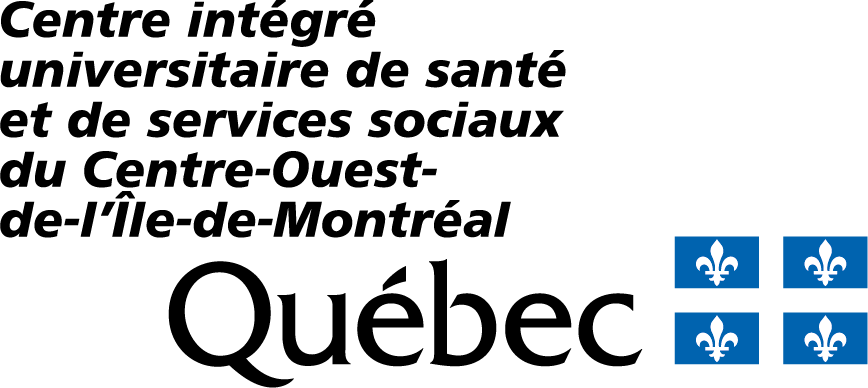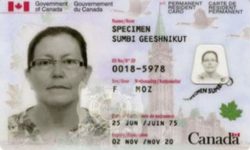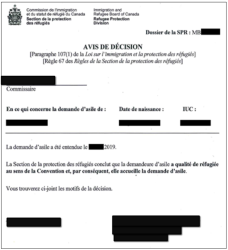Carnets de route contains information specifically aimed at refugees and refugee claimants, as well as the people assisting them. Carnets de route is intended to help you with the process of settling in when you arrive and during your first few years in Québec.
With Carnets de route, you will enjoy an engaging experience: reliable, organized and accessible information about Québec society, steps to take, to-do lists, timelines, summary diagrams and much more!
Select whether you would like to view the website in English or French, then answer the following three questions to be directed to the right information.

Your profile
Refugee Claims
Accepted Refugee Claims
Refused Refugee Claims
Refugees
Rights and Protections
Key organizations and individuals
1. Updates – Rights and protections
The content of Carnets de route was updated in November 2023, unless otherwise indicated. Some elements may have changed since then. If in doubt, consult the sources and resources in this section. You can also report any information requiring change through Technical Support. Update dates may vary by section.
2. Introduction
(Commission des droits de la personne et des droits de la jeunesse, 2023)
In Québec, there are laws and charters that protect you and allow you to exercise your rights and freedoms while respecting others and society’s overall well-being, particularly the Charter of Human Rights and Freedoms.
In Québec, personal information is kept confidential. This means that the people at the organizations you interact with cannot share any information you give them unless they have your permission to do so.
This section describes several types of discrimination and violence. It may be difficult to read. Don’t hesitate to use the table of contents to quickly locate the information you are looking for.
3. Right to non-discrimination
(Cleveland et al., 2021; Collectif Bienvenue, 2023; Commission canadienne des droits de la personne, 2022; Commission des droits de la personne et des droits de la jeunesse, 2023; Services juridiques de Pointe-Saint-Charles et Petite-Bourgogne, 2017)
“In the country where I had to wait before coming to Québec, there was no protection from discriminatory acts. Here, it’s the opposite.” – Ali
3.1 Types of discrimination
Discrimination is when someone treats you negatively compared to others. You have the right to be protected against discrimination. In Québec, there are specific laws that protect you from discrimination based on your:
- Skin colour
- Immigration status
- Place of origin
- Language
- Accent
- Religion
- Culture
- Sex and/or gender (for example, being a woman)
- Gender identity (for example, being trans)
- Sexual orientation (for example, being gay)
- Disability
- Marital status (for example, being single)
- Pregnancy
- Age (except as provided by law)
- Political convictions
- Economic status
- Etc.
Here are a few examples of situations that can arise in cases of discrimination (they may also occur for other reasons): being turned down for housing, being turned down for a job, losing your job, being denied access to certain services, etc.
In Québec, discriminating against someone because of their sexual identity is against the law. Don’t hesitate to file a complaint if you experience discrimination for this reason.
3.2 Help if you experience discrimination
If you experience discrimination or your rights are not respected, the following authorities can help you:
Canadian Human Rights Commission
Information and support if you experience discrimination
Complaints section or Ombudsman at different institutions
Find an ombudsman to file a complaint about an institution
Service Quality and Complaints Commissioner at the health institution
If you experience discrimination or to file a complaint about a health institution
Québec Ombudsman
To file a complaint with a government organization, ministry or health institution
Commission des droits de la personne et des droits de la jeunesse du Québec
Information and support if you experience discrimination
You can also speak to your host organization or sponsorship group for help with the process.
Filing a complaint will not affect your immigration status or the refugee claim process.
4. Right to non-violence
In Québec, many forms of violence are illegal and can be punished by sanctions. Situations of violence and abuse can occur with different people (a spouse, a family member, a colleague, the property owner, etc.) and in different contexts.
4.1 Types of violence
(Gouvernement du Québec, 2023m)
Here are some examples of what is considered violence under Québec law.
Physical violence
- Physical aggression (slapping, punching, etc.)
- Forcible confinement (being forcibly kept at home)
Psychological violence
- Denigration of the person
- Forced social isolation
- Opposition to the person’s participation in decisions that concern them
Sexual violence
- Forced sexual practices and/or relations
- Sexual relations with a person under the age of 16 (generally the age of consent in Canada, with certain exceptions)
- Incest
- Female genital mutilation (sending your child to a country other than Canada to have female genital mutilation is also illegal)
Economic violence
- Fraud, theft, extortion (obtaining something dishonestly)
- Extreme control or misuse of another person’s finances
Other examples of violence
- Threats of violence or death
- Harassment (pressure, demands, constant remarks)
- Abuse
- Neglect (abandonment, neglect)
- Forced labour
- Breaking and entering (into a house, for example)
- Cyberviolence (for all the types of violence listed above)
4.2 Help if you experience violence
(Collectif Bienvenue, 2023h)
If you experience violence, you can talk to a community counsellor, a health professional and/or the police.
You can also consult these resources:
911
Available 24/7 – For immediate emergency assistance (police, ambulance, fire department, etc.)
Sexual Violence Helpline
Available 24/7 – Help if you experience sexual violence – phone and chat
CAVACCrime Victims Assistance Centre
If you experience abuse or violence related to sex work, you can ask the organization Stella for help:
Stella
4.2.1 The police
If you experience violence against you, the police can help you get to safety. In Québec, the police are required to protect everyone, regardless of their origin or immigration status. However, the police can report a person without legal status to the CBSACanada Border Services Agency . The person then risks being deported.
You can contact the police by calling 911 or by going directly to a police station.
4.3 Domestic violence
(Collectif Bienvenue, 2023h; Éducaloi, s. d.; IRCCImmigration, Refugees and Citizenship Canada , 2020a; MSSSMinistère de la Santé et des Services sociaux , 1998)
4.3.1 Shelter
If you need to leave your home, you can get help and be accompanied to a shelter. Your children are protected by law in the event of domestic violence. They can come with you to shelters, if needed. Resources offer free and confidential support services.
SOS Violence conjugale
Available 24/7 – Help if you experience domestic violence
Phone, text and chat available
Text: 438-601-1211
Some shelters are trans-inclusive. Mention your needs when you ask for help.
4.3.2 Impact on your immigration status
4.3.3 Impact on your work
If you miss days of work because you experience domestic or sexual violence, you are entitled to time off. Additionally, it is illegal for your employer to fire you for this reason.
For more information, contact the CNESSTCommission des normes, de l’équité, de la santé et de la sécurité du travail :
Leave for victims of domestic or sexual violence – CNESSTCommission des normes, de l’équité, de la santé et de la sécurité du travail
5. Right to marry and separate
5.1 Marriage
(Directeur de l’état civil, 2022; Éducaloi, 2023; Gaignaire, Anne, 2013; Gouvernement du Québec, 2023a; Justice Québec, 2021)
You have the right to marry or have your union recognized, regardless of your immigration status.
In Québec, a union between two people can be recognized by marriage, civil union or common-law union.
Marriage
- This is a legal act by which two people commit to living together. These people agree to respect the rights and obligations of their union.
- If you were legally married outside of Canada, your marriage will be recognized in Canada.
- In Québec, the minimum age for marriage is 18 (or 16 with court authorization).
- In Canada, you cannot be married to more than one person at a time. You must be legally divorced or widowed to remarry.
- It is against the law to force a person to marry.
Civil union
- This is a legal act by which two people commit to living together. These people agree to respect the rights and obligations of their union.
- Civil unions are only recognized in Québec.
Common-law union
- To become a common-law spouse, you must live for at least one year at the same address as the person with whom you are in a romantic relationship.
- People in common-law unions automatically become common-law spouses and do not have to take any action.
- This type of union does not offer the same legal protection as marriage or civil union (for example, in terms of property division in the event of separation). However, children of common-law parents have the same rights.
- Common-law spouses should draw up a cohabitation or separation agreement to decide what would happen to their property and children in the event of separation.
In Québec, two people of the same gender and/or sex can marry, enter into a civil union or become common-law spouses after living together for one year. If you have a spouse of the same sex and/or gender who has remained in your country of origin:
- It is important to declare this person as your spouse on your forms.
- If you are unable to live with your spouse because this would put you at risk of persecution in your own country, you can still apply for family reunification and other procedures for this person. The eligibility criterion of having lived with your spouse does not apply in this situation.
Same-sex and/or same-gender couples can also have and raise children in the same way as other families.
5.2 Separation
(Centres de justice de proximité, 2023; Éducaloi, s. d.; Gouvernement du Québec, 2019; JuridiQC, 2023; TCRITable de concertation des organismes au service des personnes réfugiées et immigrantes , 2021; Régie de l’assurance maladie, s. d.; Retraite Québec, s. d.)
5.2.1 Impact on the immigration process
To get divorced in Québec, at least one spouse must have lived in the province for at least one year.
5.2.2 Ressources
Family mediation can be useful for separated spouses with children. This is a mandatory process if parents wish to take legal action. For more information: Family mediation | Gouvernement du Québec
There are also community justice centres in many regions of Québec. These centres offer legal information, support and guidance, particularly for couples who are separating.
Find a community justice centre
You may also need a lawyer or notary to help you with your separation. See Access to a lawyer and other legal resources in the Read This Information First section.
5.2.3 Parental obligations
Custody
Parents need to decide how much time children spend with each of them, taking into account what is best for the children.
One parent can look after the children full time or both parents can look after the children part time.
Support payments
Children:
Each parent must continue to meet all their children’s basic needs after the separation. This can be done through support payments. This is the case even if the parents were not married.
Spouse:
A person may receive support payments from an ex-spouse.
In the event of disagreement over the support payments, the judge will decide on the amount of support based on each party’s financial resources and situation.
Dividing property
The division of property is governed by the marriage contract or cohabitation agreement.
5.2.4 Lease
If you and your ex-spouse rent an apartment, you will not be able to end your lease immediately unless you come to an agreement with the property owner. However, you may be able to sublet your apartment or assign your lease to a new tenant before your lease ends.
If you are separating because of domestic violence or sexual assault, you can end your lease. The process can take up to two months.
5.2.5 Change of marital status and address
When you separate, your marital status changes officially, but not automatically. You must report your change of marital status:
- To Québec institutions (primarily the RAMQRégie de l’assurance maladie du Québec
, Revenu Québec and Retraite Québec for family benefits),
When a couple separates | Gouvernement du Québec - To Canadian institutions like the Canada Revenue Agency, Update your CRA information – Change your marital status | Government of Canada
- To the immigration authorities, i.e., IRCCImmigration, Refugees and Citizenship Canada and the MIFIMinistère de l’Immigration, de la Francisation et de l’Intégration (du Québec) . Talk to your lawyer about the impact of this change in marital status on your refugee claim process.
You may have additional steps to take depending on who has custody of the children, particularly for family benefits.
It is very important to inform government authorities and the school or daycare centre of your custody arrangements.
You must also report your change of address, if any, to various government institutions. See Change of address and contact information in the Read This Information First section.
5.2.6 Health and prescription drug coverage
Changing your marital status has no impact on your health coverage.
In Québec, prescription drug coverage is mandatory. If you are covered by your ex-spouse’s private plan, make sure to register for other prescription drug coverage with the RAMQRégie de l’assurance maladie du Québec , the IFHPInterim Federal Health Program or a private plan. See the Health Care section for more details.
5.2.7 For more information
JuridiQC – Justice Québec
General information about separation and divorce
6. Children’s rights
(Gouvernement du Québec, 2018, 2023q; MSSSMinistère de la Santé et des Services sociaux , 1998; TCRITable de concertation des organismes au service des personnes réfugiées et immigrantes , 2021)
In Québec, children’s rights are protected by the Youth Protection Act, regardless of their immigration status. The Director of Youth Protection (DYPDirector of Youth Protection ) is responsible for enforcing this law.
The DYPDirector of Youth Protection has a clear mandate, which is to protect children in situations of abandonment, neglect, psychological ill-treatment, sexual abuse, serious behavioural disturbances or physical abuse. If a child is in one of these situations, the DYPDirector of Youth Protection may intervene in a number of ways.
The role of the DYPDirector of Youth Protection is not always well understood by children or parents. Just because the DYPDirector of Youth Protection contacts you does not mean your child will be taken away from you. There are many steps that the DYPDirector of Youth Protection goes through. Placing a child in foster care is a last resort.
Anyone who believes that a child’s safety and development are in danger can report this to the DYPDirector of Youth Protection . Corporal punishment (slapping, beating with a stick or belt, etc.) is prohibited in Canada under all circumstances.
6.1 For more information
For other means of discipline or for general support with family life and children, see these resources:
Tel-jeunes
Support for youth
Phone, text and chat available
Text: 514-600-1002
Tel-jeunes – Parents
Support for parents of youth
Phone and chat available
Find a family community organization – Fédération québécoise des organismes communautaires Famille
Find a perinatal resource centre – Réseau des CRP du Québec
Information for future parents and parents of children aged 0–2
Naître et grandir
Information for future parents and parents of children aged 0–8
Find a social pediatrics centre – Alliance québécoise de la pédiatrie sociale en communauté
Support for youth and families in difficulty
7. Identity rights
(AGIR Montréal, 2023; Collectif Bienvenue, 2023g)
7.1 Change of sex and/or gender identifier
(Directeur de l’état civil, 2023a, 2023c; Gouvernement du Canada, 2023b)
You can apply to change your sex and/or gender identifier with the Directeur de l’état civil. You can apply to change your first name at the same time.
To change your sex and/or gender identifier with IRCCImmigration, Refugees and Citizenship Canada and the Government of Québec, you DO NOT need to:
- Be a permanent resident
- Provide proof of your sexual identity
- Have had gender-affirming surgeries
7.1.1 Steps to follow with IRCCImmigration, Refugees and Citizenship Canada
7.1.2 Steps to follow with the Directeur de l’état civil
After one year in Québec, you can apply to change your sex and/or gender identifier with the Directeur de l’état civil. You can also change your first name if you wish.
- You must first apply to have your act of civil status entered in the Québec register of civil status. To do this, you will need your birth certificate. See here for complete instructions: Insertion of an act made outside Québec into the Québec register of civil status This step can be complicated if you do not have a birth certificate. Ask AGIR Montréal for help.
- You can then apply to change your sex and/or gender identifier. You must submit proof of address dated within the last 12 months and proof of your current address along with your application. See here for complete instructions: Change of sex designation – Directeur de l’état civil
AGIR Montréal
Multilingual – Support for LGBTQIA+ migrants
7.2 Change of name
(Directeur de l’état civil, 2023b)
7.2.1 Steps to follow with IRCCImmigration, Refugees and Citizenship Canada
To apply to change your name with IRCCImmigration, Refugees and Citizenship Canada , ask AGIR Montréal for help to learn about the process.
AGIR Montréal
Multilingual – Support for LGBTQIA+ migrants
7.2.2 Steps to follow with the Directeur de l’état civil
After one year in Québec, you can submit a name change request to the Directeur de l’état civil.
If you apply to the Directeur de l’état civil to change your sex and/or gender identifier and your name, you will be able to change your first name but not your last name.
If you wish to change your last name, follow the instructions here:
Change of name and Insertion of an act made outside Québec into the Québec register of civil status
If you are not applying to the Directeur de l’état civil to change your sex and/or gender identifier, but wish to change your first and/or last name, follow the same instructions.
8. For more information
Canadian Orientation Abroad Participant Workbook – IOM
Multilingual
Participant workbook: Canadian Orientation Abroad Participant Workbook – IOM
“O Canada – conversations dialogue” audio guide: Canadian Orientation Abroad: O-Canada Conversations
“O Canada” mobile application: O Canada – App Store
For additional information and exercises on many aspects of this Carnets de route section, see pages 12 to 34, in the Canadian Orientation Abroad “Participant’s Workbook”.
You can also listen to the audio guide “O Canada – Conversations Dialogue” and download the application “O Canada”.
To-do list
- Seek help if you experience discrimination or your rights are violated
See the Rights and Protections section of the Carnets de route website for information about your rights and available resources
File a complaint if you wish
- Seek help if you experience violence
See the Rights and Protections section of the Carnets de route website for information about your rights and available resources
- Ask for help to ensure your safety
See the Rights and Protections section of the Carnets de route website to learn about the implications of common-law unions in Québec
If you are separating
Go into mediation, if necessary
Find a lawyer or notary, if necessary
Agree on child custody and support payments, if necessary
Agree on how to divide property and on living arrangements (assignment of a lease, moving)
Make sure you have prescription drug coverage (private or public – RAMQRégie de l’assurance maladie du Québec )
- For your change of marital status
Inform the school and/or daycare centre of the child custody arrangements
Report a change of address as soon as possible: see the Read This Information First section.
See the Rights and Protections section of the Carnets de route website to learn about children’s rights and resources for families


